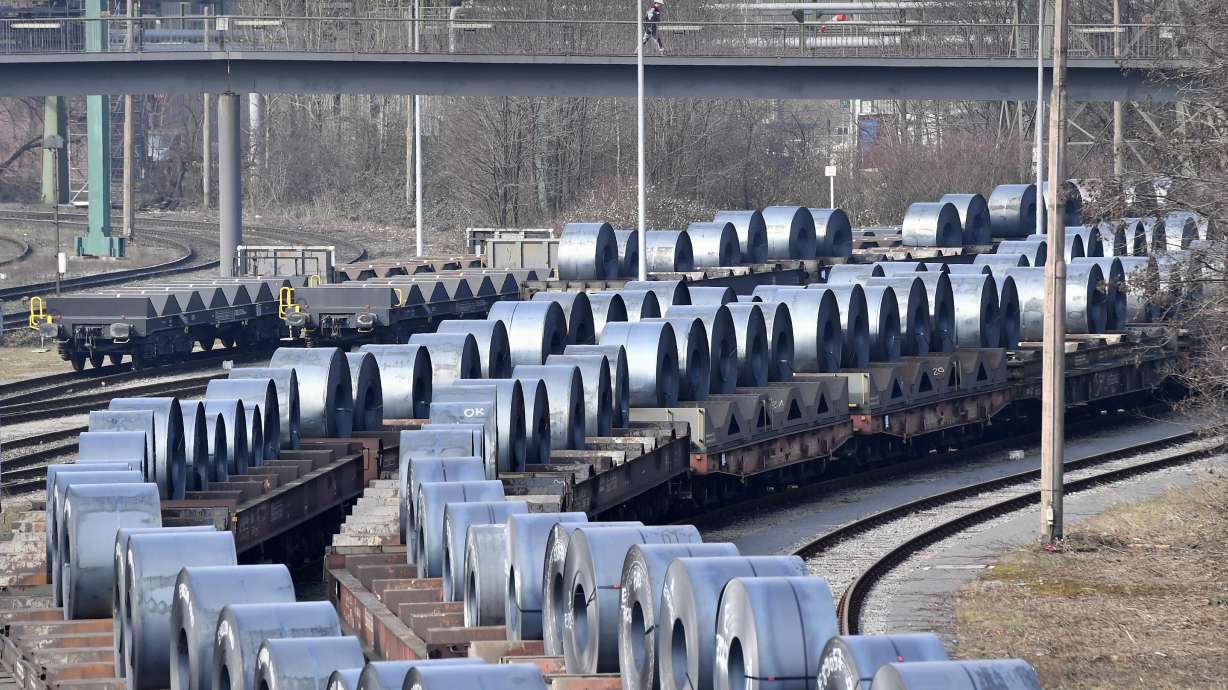Estimated read time: 3-4 minutes
This archived news story is available only for your personal, non-commercial use. Information in the story may be outdated or superseded by additional information. Reading or replaying the story in its archived form does not constitute a republication of the story.
WASHINGTON (AP) — Few issues could blur the lines of partisanship in Trump-era Washington. Trade is one of them.
President Donald Trump's announcement that he will impose stiff tariffs on imported steel and aluminum has labor unions and liberal Democrats in the unusual position of applauding Trump's approach, while Republicans and an array of business groups are warning of dire economic and political consequences if he goes ahead.
Trade politics often cut along regional, rather than ideological, lines, as politicians reflect the interests of the hometown industries and workers. But rarely does a debate open so wide a rift between a president and his party — leaving him almost exclusively with support from his ideological opposites.
"Good, finally," said Sen. Sherrod Brown, an Ohio Democrat and progressive as he cheered Trump's move. Sen. Bob Casey of Pennsylvania, a Democrat who has called for Trump to resign, agreed.
"I urge the administration to follow through and to take aggressive measures to ensure our workers can compete on a level playing field," Casey tweeted.
This moment of unusual alliance was long expected. As a candidate, Trump made his populist and protectionist positions on trade quite clear, at times hitting the same themes as one of the Democratic presidential candidates, Vermont Sen. Bernie Sanders.
"This wave of globalization has wiped out totally, totally our middle class," Trump told voters in the hard-hit steel town of Monessen, Pennsylvania, during one of his campaign stops. "It doesn't have to be this way."

Trump's criticism of trade agreements and China's trade policies found support with white working-class Americans whose wages had stagnated over the years. Victories in big steel-producing states such as Ohio, Pennsylvania and Indiana demonstrated that his tough trade talk had a receptive audience.
In a March 13 House election in Pennsylvania, Republican Rick Saccone has voiced support for Trump's approach, while Democrat Conor Lamb's campaign didn't respond to a request for comment.
"Rick supports free trade as long as it's fair. If other countries aren't playing by the rules and tariffs are needed to protect steel and aluminum jobs in southwestern Pennsylvania, Rick would support those measures," Saccone's campaign said.
But Trump's GOP allies on Capitol Hill had little use for the tariff approach.
Opponents of Trump's proposal to place a 25 percent tariff on steel and a 10 percent tariff on aluminum said other industries that rely on the products will suffer. The cost of new appliances, cars and buildings will rise if the president follows through, they warned, and other nations could retaliate. The end result could erode the president's base of support with rural America and even the blue-collar workers the president says he trying to help.
"There is always retaliation, and typically a lot of these countries single out agriculture when they do that. So, we're very concerned," said Sen. John Thune, R-S.D.
Related
Gov. Scott Walker, R-Wis., asked the administration to reconsider its stance. He said American companies could move their operations abroad and not face retaliatory tariffs.
"This scenario would lead to the exact opposite outcome of the administration's stated objective, which is to protect American jobs," Walker said.
Tim Phillips, president of the Koch Brothers-backed Americans for Prosperity, noted that Trump narrowly won in Iowa and Wisconsin, two heavily rural states that could suffer if countries put in retaliatory tariffs on American agricultural goods.
"It hurts the administration politically because trade wars, protectionism, they lead to higher prices for individual Americans," Phillips said. "It's basically a tax increase."
The president wasn't backing down, at least on Twitter, where he posted this message: "Trade wars are good, and easy to win."
____
Reach Kevin Freking on Twitter at https://twitter.com/APkfreking
Copyright © The Associated Press. All rights reserved. This material may not be published, broadcast, rewritten or redistributed.









